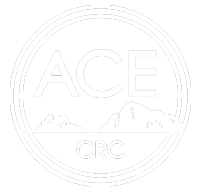Message from the CEO
Iceberg B9B did Antarctic scientists a favour in January 2010 when it dislodged the Mertz Glacier tongue, revealing a whole new underwater environment previously covered by hundreds of metres of ice. This has allowed a great natural experiment to unfold, giving us an opportunity to find out more about how the environment in this region will change now that the 40km by 80km glacier tongue has moved on.
Since our last newsletter ACE CRC Oceans program leader Steve Rintoul led a team of 40 Australian and international scientists aboard Aurora Australis to the Mertz region in Antarctica. The team set up cameras, moorings and sensors, and took measurements at 149 stations over the continental shelf and slope in the area.
They found that since the glacier tongue moved and changed the conditions in which the ocean and atmosphere interact, the water forming over the Antarctic shelf is less dense, or, if you like, less salty. The formation of this dense, salty water in Antarctica (Antarctic Bottom Water) is integral to global ocean circulation and ocean temperature. Studying what happens to the production of Antarctic Bottom Water in the Mertz region will help us predict how this component of the great ocean overturning circulation might respond to future climate change.
In a much warmer part of the globe, ACE had a strong presence at Greenhouse 2011 in Cairns in April, where we launched "Report Card: Southern Ocean Acidification". The Report Card is an update on what we now know in the expanding research field of ocean acidification. Some species, and possibly whole ecosystems could be at risk from the decrease in the pH of the Southern Ocean as it takes up more anthropogenic carbon from the atmosphere. The Earth's colder waters absorb more carbon dioxide than warmer waters. The Southern Ocean can therefore provide us with an early-warning system of how ocean acidification will affect marine ecosystems around the globe. The Report Card draws on the work of scientists at the ACE CRC and the Australian Antarctic Division, and was led by ACE's ocean acidification project leader, Donna Roberts.
We had another high point in the Climate Futures for Tasmania project with the joint launch in March of the Impacts on Agriculture, and the Water and Catchments reports by the Deputy Premier of Tasmania, Bryan Green, and the then Minister for Climate Change, Nick McKim. This research is now with the communities who will use it. The launch in March was the culmination of three years of research and collaboration that will serve Tasmania in the decades ahead with detailed information on how climate change will impact on agriculture and water and catchments.
Climate Futures for Tasmania not only gives the Tasmania Government the information it needs for sound decision-making, but it provides a model for similar projects throughout Australia and the world.
We were pleased to host the CRC Committee Chair, Neville Stevens, with Kris Browne and Prue Torrance for our First Year Review in March. This review process was successfully completed and provided a great opportunity to discuss the ACE CRC's progress and its transition from the last ACE CRC to the current CRC.
The ACE CRC also hosted a briefing on our climate change research for Tasmanian state and federal members of parliament. The aim was to foster an understanding of the process used by the Intergovernmental Panel on Climate Change to develop its climate change assessment reports, and to showcase the role of ACE science and scientists in this. ACE also hosted a visit from the then Tasmanian Minister for Climate Change, Nick McKim. The Minister spoke with ocean acidification and ice core scientists, and issued a media release after his visit, describing ACE CRC scientists as "world leaders in their field". This has been underlined once again with the publication in Nature of research from the members of our Cryosphere Program who are part of the international ICECAP team.
I'm writing this message at the time of the release of the Climate Commission's report on climate change. Once again there is a clear and unequivocal underscoring of the causes and path of climate change. The research being undertaken through the ACE CRC provides a significant contribution to Australia, and the world's, understanding of the global climate system and climate change. From the giant Mertz glacier, to the microscopic organisms affected by ocean acidification, ACE research is building our knowledge and ability to tackle climate change: something we ignore at our peril.
Tony Press






















